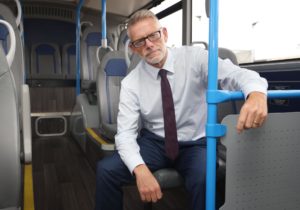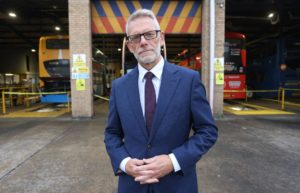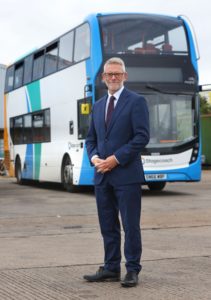Darren Roe: Face to Face
On the eve of the publication of an open letter about public control of buses from Darren Roe, MD of Stagecoach East, B&CB Editor Mark Williams went to meet him face to face. As always, he’s candid and forthright
There’s a buzz of energy around Darren Roe, MD of Stagecoach East, which contrasts sharply with many of the more laconic bus company managers I’ve met.
In fact ‘buzz’ may be an understatement; he’s quite exhausting to listen to, and I mean that as a compliment. It was evident when I heard him talk at a CPT event in London – actually the trigger for me to set up an interview.
Darren’s energy was evident the moment he walked into the room with Stagecoach East’s PR guy, the excellent Stephen Kiely. The pleasantries were short and we got straight into the interview. I had the strongest impression Darren’s day was mapped out to the minute. First, I wanted to know about his journey in the industry.
HGV and PCV CV
“I’d always wanted to be an engineer, really. That’s where my passion is; fixing stuff.And to be honest, I saw my future in trucks, not buses. I had an opportunity to apprentice at a truck dealership, but mum saw an advert at West Riding with buses. She said ‘You’ll be better in buses’ and I haven’t looked back since.”
So Darren served his apprenticeship then did a couple of years in Saville Street Bus Station in Wakefield as a shift fitter, left to Darlington as a technical assistant: “A couple of months after I left Saville Street it became a Tescos – it was alright when I was there,” he quips, but says the supermarket succession continued. “In Darlington we had Richmond, and Ripon and Loftus and Hartlepool – some great depots. I did a couple of years in Grange Road then, six months after I left, it became a Sainsburys. I was starting to panic a little bit…”
Darren did get a seven-year stint in trucks, working at P&O, and latterly at a Renault truck dealership, then saw ads for assistant engineering directors’ roles at Stagecoach – one in Scotland, one in the North East, one in Manchester, and one in London. He went for the interviews: “I got home from work one day and my wife said ‘You’ve had a phone call from Stagecoach’ I said ‘They’re going to offer me a job if they’re ringing on a Saturday.’
“I remember she sat on the bottom of the stairs and I asked her which one to take. She said ‘Let’s go to Manchester.’ I was only there a few months when the engineering director was posted to London. They came to me and said ‘Look Darren. You’ve only been here three months so we can’t make you engineering director. We’re going to recruit.’ Well, they couldn’t find anyone. I started to think ‘I can do this.’
“We had a great MD there, Tom Wildman – fantastic guy – and he told me the problem but said they were going to advertise again. I asked if I could have a shot at the job, and he agreed. I got it. I stayed in Manchester for about 11 years.”
By that time, Darren’s MD was Mark Threapleton, but Mark then transferred to London. He called Darren to see if he wanted a change of scenery: “I said OK, so we moved house, kids and family in 2011.”
In 2017, there was a new strategy launch, in which Stagecoach wanted to involve Darren: “I said ‘OK.’ I’m that kind of a guy that nothing’s a problem.’ He took on the task, which involved resolving engineering challenges at several locations, including Stagecoach East. Then the East engineering director left, and they asked him to ‘look after’ Cambridge for a while. Once again, it was a ‘Can do’ and, two years on, he landed the Managing Director’s role.
Shout to the top
“I’m the only career engineer MD in UK bus,” he says. “Though my boss, Simon Greer, is an engineer. Engineers are very process driven, so operationally, that’s how we roll. If I struggle at all it’s with commercial; it’s not a science, it’s a feeling…making a call on a decision. There’s not a manual for it.
“It’s taken a while for me to get there, and it’s underlined to me why you need teams, and that diversity within senior teams. You need the process guy but you also need that woman who great on numbers, someone good at marketing. We’ve done a lot of work developing the team. We use Insights [the team effectiveness system]. It considers the type of person each of us is, such as someone reflective; the person who says nothing at the meeting, so you think they aren’t listening, then comes to you the next day with a solution.
“We each knows where we all sit, like vitamins and minerals. The big challenge was Covid, and I guess we had to decide coming out of it where we were going to play; we had a lot of routes that weren’t performing going into Covid. In January 2022, we were faced with effectively £8m in losses, and talk of funding dropping. On the services we were losing on, the average subsidy per passenger was close to £54. We had to make the tough call to take out a fifth of the business, 22 routes.
“We went through a lot of pain, as did the customers. But we had to do it. We took those assets and put them into services we thought could come back to strength. We also took the opportunity to enhance the terms and conditions for all our drivers and engineers. That helped us stem the tide and attract some talent.”
Darren says that then, the £2 fare cap kicked in and so he can’t claim all the credit for the bus recovery: “I had all my assets in the right place to take massive advantage of the fare cap, so we got a 30% uplift in passengers, so it’s been great. We’re still behind where we were pre-Covid but I had all my ducks in a row at the right time.”
Darren says that, as a visual person, he decided to map the entire network on a map on the wall, recording routes, rail, population, train fares, depots: “It was like Churchill mapping the D Day landings”
A rural transport summit which involved former Transport Minister Norman Baker looked at ways to reconnect the many rural routes on Stagecoach East’s patch: “We did as much as we could.” Darren says that, as a visual person, he decided to map the entire network on a map on the wall, recording routes, rail, population, train fares, depots: “It was like Churchill mapping the D Day landings, or a crime scene investigation wall. But then I could visualise where we were going to go and how we were going to do it.”
The Cambridge area has mapped its future, with 150,000 homes planned and a STEM area (Science, Technology, Engineering and Maths), the biomedical campus where 12 Nobel prize winners work: “And then we have the Fenland, the bread basket of the UK – a vast area of a lot of fields where you are trying to run a service. Cambridge and Peterborough are the two fastest-growing services in the UK. There are bus MDs across the UK who’d give their eye teeth to be in the same position as I am, in terms of potential.
“But we’ve got a challenging political landscape,” says Darren, listing the councils, bodies and business boards which create the bureaucracy: “Having said that, they’re planning four new busways feeding into Cambridge, as well as the existing St Ives guided busway. But we’ve got an 800-year-old city where we can’t knock stuff down to make wider roads.
“On top of which, Cambridge is very ‘pro’ active travel, and with lots of cyclists, you’re always going to get sharp elbows, fighting for roadspace. Maintaining reliability is quite a challenge.”
I suggest that, in the Mayor, Dr Nik Johnson, Darren at least has a listening ear. He replies that Nik is part of the group of ten metro mayors: “I am very fortunate that, of all the MDs ‘marking’ metro mayors, I’m the only one that can get close to mine. We’re on speed dial – in fact, he called me this morning.
“I have the same frustrations with them comparing their cities to London and Manchester; having worked in both, I can tell you that the only thing you can learn from London and Manchester is that they are London and Manchester”
“He works with us and he cares. You cannot put a value on that. Yes, they’re going for franchising, all part of the new government push, so I have the same frustrations with them comparing their cities to London and Manchester; having worked in both, I can tell you that the only thing you can learn from London and Manchester is that they are London and Manchester.
“But I’ve taken the stance that I am not an elected official and whatever model of service you want to run, we’ll support, you, share our learnings and make that happen. On the other hand, there are options in terms of an enhanced partnership.”
Darren says he’s frustrated that, having been at Stagecoach East since 2018, it’s 2024 and they have only just got the public consultation on the plans; that’s six years when little has happened. In some areas, they have plans in place and BSIP funding, are building infrastructure and bus priority: “But we’ve had to put our foot on the ball for six years.”
To try to engage its audience, Stagecoach East has been running a series of ‘Behind the bus’ open days to which it has invited every stakeholder so they understand better the challenges bus companies face. It’s been a huge success: “To watch people seeing it for the first time, it’s obvious that they are understanding things they didn’t understand before,” says Stephen, the company’s PR manager. Darren immediately cites an example.
“I had a conversation with a senior leader yesterday, who complained about bus services coming through St Ives. She asked ‘What’s going on? Why are they so delayed?’ I replied ‘It rained in Bedford.’ She thought I was taking the mickey. ‘All that water goes into the Great Ouse,’ I said. ‘It goes out through St Ives to Earith, heading to the Hundred Foot Drain. The drainage boards flood land to relieve the pressure, and flood the Earith road, so everything has to come through St Ives. That’s why the buses are running late.’ But I absolutely understand why people don’t understand why rain in Bedford can make buses late in St Ives.”
He says the crunch time is when he takes visitors into the control room at 2pm, and they see the buses mapped on a computer. It all looks very ordered. Then he shows them what the same map looked like at 5pm the previous day: “It’s a sea of red. The message is that, once our buses go on the road each day, their performance is overwhelmingly down to highways.”
“We’ve only got the yin and none of the yang at the moment. Another aspiration is a fully EV fleet by 2030. That’s five years away. Where’s the money coming from?”
The aspirations for performance in the public consultation are really pushing the boundaries, says Darren. The Cambridge and Peterborough Combined Authority want the doubling of bus passengers by 2030. He says the other side of the ledger must be red routes, congestion charging and bus priority: “We’ve only got the yin and none of the yang at the moment. Another aspiration is a fully EV fleet by 2030. That’s five years away. Where’s the money coming from?
“I’m really supportive and I want it to happen for them, but we need the oxygen of reality here.”
But that’s just the cities. Darren really worries that he’s going to struggle to support the many rural communities in Fenland. Nik Johnson has championed a council tax precept to fund supported services and, to some extent, it has been helpful to balance the books.
Darren says there are small bus services in the rural mix, such as patient and community transport, but there’s no co-ordination. He says operators of these lifeline services unfortunately work in silos, but the Mayor could perhaps begin to pull the threads together.
What’s top of Darren’s wish list for buses in the area? “All of the area’s operators are aligned in wanting to provide the best us services that they can,” he begins, and explains that there is now a Cambridge and Peterborough Bus Alliance, which melds the ideas of almost all the local operators to give a single voice and may achieve multi-operator ticketing. “My fellow operators have a passion for the service.
“Our challenge is the stakeholders not understanding the problem. They say ‘We want more buses,’ and we can put a bus down every street, but how much do they cost?
“So my wish would be that we could get together as a group and set out what we are trying to achieve. We could do it better, faster and cheaper than under a regulatory environment. There are lots of examples across the UK we could work with. The top five local authorities for bus trips per capita all run an Enhanced Partnership.”
People matter
Stagecoach East carries 90,000 passengers a day, and they all matter to Darren. He says he looks at the company Twitter feed every morning when he gets up and first thing when he gets home.
I tell him that’s bad for his health. He agrees, and he says every negative comment gets him wound up: “But I need to have that. I need to feel the pulse. For the last six weeks, I’ve turned up at a bus stop to see the loadings, because I knew we had a problem and I wanted to see it for myself.”
Decarbonisation is a challenge which is getting more affordable, he says, and believes that electrification should be done at as big a scale as possible, especially for infrastructure installation. He says standardising the buses and sharing chargers with other users, plus other economies of scale will solve some of the costs. He says repower [such as that done by NewPower, Equipmake, Magtec, Kleandrive] has potential, and maybe hydrogen.
“It’s really exciting times, though. We set three new apprentices on this year. We have about 16. I always meet them and talk to them. I tell them you’ve joined at a really good time for the industry. We’ve got all this emerging technology, and you’re right at the start of it.”
Depot plans
Peterborough is a particular focus for Darren, because it has an ageing depot right in the centre of a suburb, which the council is keen to redevelop. There are, says Darren, three alternative sites under consideration, all suitable for bus depots but the local authority undecided on whether they want to own one, lease one or sell one to Stagecoach. He believes that franchising anxiety is holding back the decision.
Darren’s right behind leaving the depot in Lincoln Road, itself an area slated for redevelopment: “Peterborough needs a bit of love at the moment in some areas. It’s been a really important place for us. We’ve been there for 40 years. We know every pothole and low branch. To be honest, congestion is less of a problem than in Cambridge.”
As a New Town, Peterborough has a city centre surrounded by townships, all served by a ‘parkway’ dual carriageway ring road. But no buses ply the ring road, making every journey from one township to another, or into the industrial parks, a matter of heading for the city hub and back out again. Darren cheers me up (as a Peterborough resident who faces just such a bus journey, so opts for the car) and tells me that one of the Mayor’s ‘Tiger’ services will serve the parkway, and Stagecoach East will probably be running it.
“We’re just in a standstill period seeing how that could work. The Mayor has set out 30 Tiger routes and we’ve bid for them all. It means finding 20 vehicles from somewhere, but that’s a nice problem to have.”
Infrastructures woes
Darren worries about the state of the 3,000 bus stops his buses serve, and the bus stations which are mostly run-down or inadequate: “All I can do is keep raising the issue. But I gained some perspective from another Mayor and he said his local authority has responsibility for one child with special needs which cost £16,000 a week, and he has 274 people like that. So when I go asking for more money for bus stops, we have to understand that funding is finite.”
On the horizon, the Stagecoach East patch is ripe with opportunities, says Darren, whether it’s industrial or housing developments, mayoral pushes for better services or opportunities to acquire neighbouring companies. He’s undoubtedly got the energy to keep pace with the changes: “I never hit the snooze button in the morning,” he says, as our conversation winds up. “But I’ve got a fantastic team. I’m confident that, whatever the local authority chooses, I’ve got the right people.”
Before the interview, I’d had a chat with one of Darren’s team. I cheekily asked what he’s like as a boss: “He’s the best person I’ve ever worked for,” they said, without hesitation. I reflected later that, as a bus user and resident of the area Stagecoach East serves, I’m glad we have him working for us, his customers.